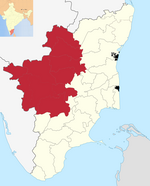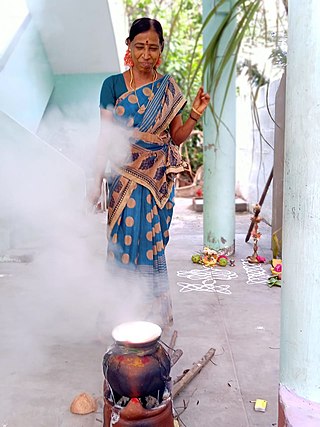
Pongal, also referred to as Thai Pongal, is a multi-day Hindu harvest festival celebrated by Tamils. It is observed in the month of Thai according to the Tamil solar calendar and usually falls on 14 or 15 January. It is dedicated to Surya and corresponds to Makar Sankranti, the Hindu observance celebrated under many regional names throughout the Indian subcontinent. The festival is celebrated over three or four days with Bhogi, Surya Pongal, Mattu Pongal and Kanum Pongal, observed on consecutive days.
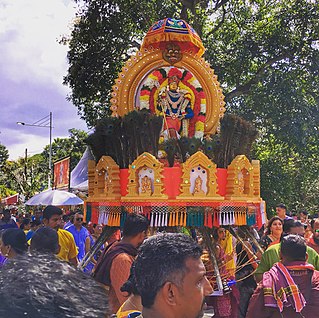
Thaipusam or Thaipoosam is a Tamil Hindu festival celebrated on the first full moon day of the Tamil month of Thai coinciding with Pusam star. The festival is celebrated to commemorate the victory of Hindu god Murugan over the demon Surapadman. During the battle, Murugan is believed to have wielded a vel, a divine spear granted by his mother, Parvati.

Gobichettipalayam is a town and municipality in Erode district of the Indian state of Tamil Nadu. It is the administrative headquarters of Gobichettipalayam taluk. It is situated at the center of the South Indian Peninsula at 213 metres (699 ft) above sea level, surrounded by Western Ghats. It is located 35 kilometres (22 mi) from the district headquarters Erode, 44 kilometres (27 mi) from Tiruppur and 80 kilometres (50 mi) from Coimbatore. Agriculture and textile industries contribute majorly to the economy of the town.
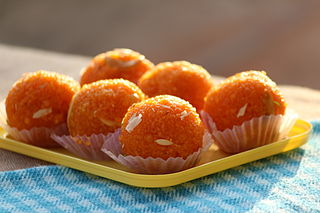
Laddu or laddoo is a spherical sweet from the Indian subcontinent made of various ingredients and sugar syrup or jaggery. It has been described as "perhaps the most universal and ancient of Indian sweets."
Bogar, Bhogar, or Boganathar was a Tamil Shaivite Siddhar. He was a disciple of Kalangi Nathar. He was born in Vaigavur near Palani Hills. He received his education from his mother and his grand father described in several traditions and texts. Bogar himself describes his native roots in his book "Bogar 7000". Bogar went from Tamil Nadu to China and taught about enlightenment, this is also mentioned in his book Bogar 7000. Bogar is said to be in "nirvikalpa samadhi" below the sanctorum of Palani Murugan hill temple. The Tamraparniyan sea route was adopted by Bogar in his travels from South India to China via Sri Lanka.

Kongu Nadu, also known as Kongu Mandalam, refers to the geographical region comprising the western and north-western part of the Indian state of Tamil Nadu and in some instances, parts of southeastern Karnataka and eastern Kerala. The region covers an area of roughly 60,895 km2 (23,512 sq mi) with a population of over 27.4 million.

Panchamrita is a mixture of five foods used in Hindu as well as Jain worship and puja and Abhiṣeka It is often used as an offering during pooja post which it is distributed as prasad.
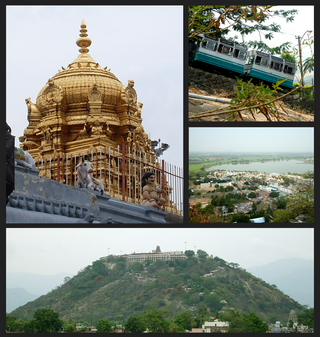
Palani (Tamil:[paɻani], is a town and a taluk headquarters in Dindigul district of the western part of Tamil Nadu state in India. It is located about 106 kilometres south-east of Coimbatore and 122 kilometres north-west of Madurai, 67 kilometres from Kodaikanal. The Palani Murugan Temple or Arulmigu Dhandayuthapani Swamy Temple, dedicated to Murugan is situated on a hill overlooking the town. The temple is visited by more than 7 million pilgrims each year. As of 2011, the town had a population of 70,467 and the Taluk had a population of 292,301 which makes it the second largest town in the district after Dindigul.
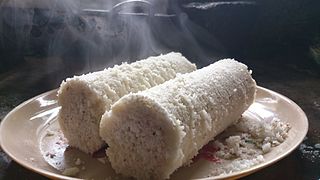
Puttu, also called pittu, is a dish native to the Southern Indian states of Kerala, Tamil Nadu, and parts of Karnataka, as well as Sri Lanka. It is made of steamed cylinders of ground rice layered with coconut shavings, sometimes with a sweet or savory filling on the inside. Puttu is usually a breakfast dish served hot with either sweet side dishes such as palm sugar or banana, or savoury with chana masala, chutney, rasam, or meat curries.

Pulihora, also known as Pulisoru, Pulinchoru, Puliyogare, Puliyodarai, Ambad Baath, Kokum rice, or simply Tamarind rice, is a common and traditional rice preparation in the South Indian states of Karnataka, Kerala, Tamil Nadu, Andhra Pradesh and Telangana. Puli means 'tangy' or 'sour' in South Indian languages, referring to the characterizing use of kokum or tamarind as one of the main ingredients.
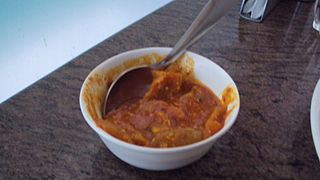
South Asian pickle is a pickled food made from a variety of vegetables, meats and fruits preserved in brine, vinegar, edible oils, and various South Asian spices. The pickles are popular across South Asia, with many regional variants, natively known as lonache, avalehikā, uppinakaayi, khatai, pachadi or noncha, achaar, athāṇu or athāṇo or athāna, khaṭāī or khaṭāin, sandhan or sendhan or sāṇdhāṇo, kasundi, or urugaai.
Tiruchengode is a selection-grade municipality located in western part of southern Indian state of Tamil Nadu. It is famous for the ancient hilltop Ardhanareeswarar Temple, dedicated to the unique combined male-female form of Lord Shiva and Goddess Parvathi. This important place of pilgrimage is mentioned in the Tamil work Silapathikaram as 'Nedulkundru' and is celebrated in the hymns of Saivite saints. The equally famous Chenkottu Velavar Temple, dedicated to Lord Murugan, is situated on the same hill. As of 2011, the town had a population of 95,335. As per 2011 population, Tiruchengode is the largest city in Namakkal district. It is also famous for rig business.

Dhandayuthapani Swamy Temple is a Hindu temple dedicated to Murugan situated atop a hillock amidst the Palani Hills in Palani, Dindigul district of Tamil Nadu. It is one of the Six Abodes of Murugan. The temple is managed by the Hindu Religious and Charitable Endowments Department of the Government of Tamil Nadu.

Ada, Ela Ada, Patholi, Genasele, or Yelaiyappam is an Indian sweet and traditional Kerala, Karnataka and Konkan delicacy. It can be seen even in parts of Tamil Nadu as well, consisting of rice parcels encased in a dough made of rice flour, with sweet fillings, steamed in banana leaf and served as an evening snack or as part of breakfast. Grated coconut and rice flour are the two main ingredients. It is a snack made out of raw rice flour, sugar or jaggery and grated coconut. It is usually prepared on Onam. Poovada is prepared in the tip end of the plantain leaf as the Nivedyam for Onam, into this ada goes, with the coconut filling, a sprinkling of the Thumbapoo, making it more auspicious. Sometimes banana is also added in the filing which is coconut-jaggery-banana filling. Spicy Ottada is a unique breakfast with maida and rice flour as the main ingredients. It can be also made without maida, but using the rice flour alone and it is not steamed instead cooked on Tava or flame. Sometimes the fillings inside ada would be Chakkavaratti. Ada is also given as Prasadam to devotees at temples in Kerala.

Tamil Nadu is the southernmost state of India located on south-eastern coast of the Indian peninsula. The state is straddled by Western Ghats and Eastern Ghats to the west and north and the waters of Bay of Bengal and Andaman Sea on the other two sides. It is the home of the Tamil people, who speak Tamil language, one of the oldest surviving languages. The capital and largest city is Chennai which is known as the "Gateway to South India". As of 2021, the state is the most visited and has received the most number of tourists amongst all states of India.
Culture of Coimbatore is based on the culture of the Kongu Nadu region and is distinctly unique. Being a cosmopolitan city, the culture of the city reflects its diverse population which has resulted in a unique blend. Though it is generally considered a traditional city, Coimbatore is more diverse and cosmopolitan than other cities in Tamil Nadu. Traditional music, dance and all other art forms of Tamil Nadu are very popular in the city. One can find a unique blend of culture from traditional foods to fast foods, from ancient temple architecture to modern high-rises and from classical music and dance to the growing nightlife in the city. Popularly called as the Manchester of South India, the city is known for its industries and has developed a reputation for entrepreneurship.

Uthiyur is a small town in Kangeyam taluk of Tiruppur district in south Indian state of Tamil Nadu.
Kartikeya temple is a type of Hindu temple where the main deity is Lord Kartikeya, one of the sons of prime Hindu deities Lord Shiva and Goddess Parvati. Such temples are usually found in the southern part of India and the south eastern Asian countries. There are six abodes of Lord Murugan all of which are in Tamil Nadu state of India.
Sirumalai Hill Banana is a type of banana grown in the Sirumalai region in the Palani Hills of Western Ghats in the Indian state of Tamil Nadu. It was declared as a Geographical indication in 2008–09.
Virupakshi Hill Banana is a type of banana grown in the Virupakshi region in the Palani Hills of Western Ghats in the Indian state of Tamil Nadu. It was declared as a Geographical indication in 2008–09.
















